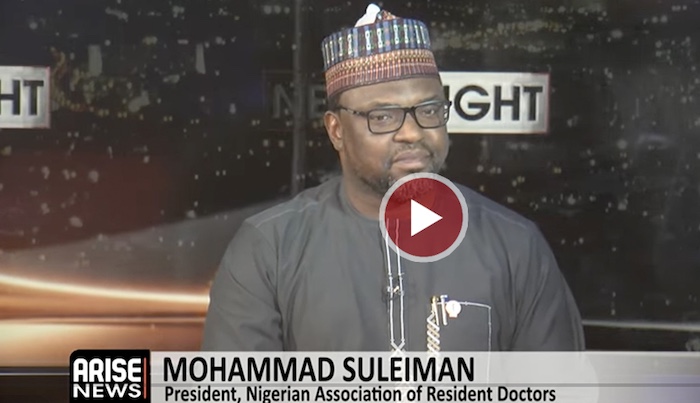The President of the Nigerian Association of Resident Doctors (NARD), Dr. Mohamed Suleiman, has announced that the association will begin an indefinite nationwide strike on November 1, 2025, following the federal government’s failure to meet a series of unresolved demands despite a 30-day ultimatum.
Speaking in an interview on ARISE Newson Sunday, Dr. Suleiman said the decision came after a five-hour meeting of the association’s National Executive Council (NEC) on Saturday, where over 200 members agreed that dialogue with the government had reached a dead end.
“Unfortunately, after the 30 days, it was on day 26 that we had just a one-hour conversation with people who are supposed to sort out these problems,” he said. “This decision wasn’t taken lightly. The last time NARD went on strike of this nature was over two tenures ago.”
The NARD president explained that several ministries, departments, and agencies had failed to act on critical issues affecting doctors, including the Federal Ministry of Health, Ministry of Labour, IPPIS under the Office of the Head of Service, and the Ministry of Finance.
He emphasised that the strike was not only about salaries but also about justice and professional recognition.
“We have five doctors who were unjustly dismissed from the Federal Teaching Hospital Lokoja. We are demanding their reinstatement,” he said. “There’s also the issue of our membership certificate being devalued. That certificate used to recognise us as specialists-in-training, but the government downgraded it. Ironically, in Ghana and Liberia, the same certificate is recognised for specialist status.”
Dr. Suleiman painted a grim picture of the workload and manpower crisis facing resident doctors across the country.
“Twelve years ago, we had 16,000 resident doctors at the federal level and about 6,000 at the state level. Today, less than 9,000 remain federally, and fewer than 1,500 at state level. Over 50 percent have left Nigeria,” he said.
He described the working conditions as “inhumane”, adding that doctors often work over 120 hours a week, sometimes without rest days or compensation.
“I work 120 hours weekly as a resident in internal medicine. In surgery, it’s even worse,” he said. “Some of my colleagues are on call 31 days in a month. There’s burnout, there’s sickness, and sadly, we’ve lost some of our colleagues because of it.”
According to Suleiman, while the government continues to launch new healthcare projects and facilities, the workforce sustaining them remains underpaid and overstretched.
“We have doctors who can’t pay rent or fuel their cars. Some can’t afford their children’s school fees,” he said. “Show me one minister, one governor, or one permanent secretary who has two years’ salary arrears. Yet, that’s what doctors are facing.”
Calling for direct intervention from President Bola Ahmed Tinubu, Dr. Suleiman urged him to “cut through bureaucracy” and engage professionals, not politicians, in addressing the crisis.
“I call on the father of the nation, President Asiwaju Bola Ahmed Tinubu, to take charge. Politicians will not solve this problem. Professionals will,” he declared. “We are the ones collapsing at work, we are the ones treating patients, and yet we’re treated as if we don’t matter.”
He revealed that despite repeated efforts, he had only managed to meet the Minister of State for Health since assuming office 30 days ago.
“I have not had a sit-down with the Coordinating Minister of Health and Social Welfare. I’ve not met the Minister of Labour either,” he said. “A collective bargaining agreement platform was set up to discuss salaries, meant to last one month. It’s now dragging into the third month with no progress.”
Comparing Nigerian doctors’ pay with their counterparts abroad, Suleiman noted that doctors working for international NGOs within Nigeria earn twice the salary of government-employed doctors, despite capped working hours.
“A colleague told me his former house officers now work with an NGO, capped at 208 hours monthly, and they earn double his salary,” he said. “Meanwhile, he’s on grade level 15 and can barely survive.”
Despite the challenges, Suleiman reaffirmed the doctors’ commitment to Nigeria but warned that the system was breaking down.
“We are proud Nigerians. Nigeria trained us, and we want to serve. But this is not sustainable. You can’t keep producing doctors and losing them to other countries,” he said. “You don’t joke with soldiers, teachers, or doctors. We are essential workers.”
Dr. Suleiman concluded by describing the looming strike as a “national security crisis” that the government must treat with urgency.
“It’s a national security disaster,” he warned. “If we don’t act now, Nigeria’s healthcare system will collapse completely.”
Boluwatife Enome

